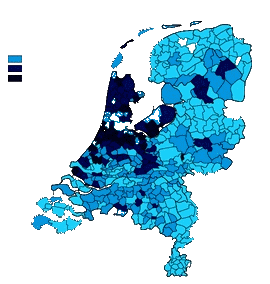Political context
 Political parties hired American marketing firms to carry out modern campaign strategies using digital means with which all available information, on voting behavior and distribution of voters to demographics over the regions or cities, was used as input to develop new local marketing strategies. Bigdata and social media were fully deployed, everything was used to move the voter to vote for their party. For example, in advertising purposefully populist gut feelings were fueled in order to steal votes from the competition. Not only during elections, but throughout the entire year MPs were busy monitoring the national media: if something got attention in the national or social media, for example after a broadcast of a ( mostly limited) Journalism (research) broadcasting, parliamentary questions were filed immediately. Electoral win became a key task rather than an indirect consequence of the political work. A road back seemed impossible: everyone seemed to be dealing with these issues of the day, forgetting the longterm policy. Not participating meant political suicide.
Political parties hired American marketing firms to carry out modern campaign strategies using digital means with which all available information, on voting behavior and distribution of voters to demographics over the regions or cities, was used as input to develop new local marketing strategies. Bigdata and social media were fully deployed, everything was used to move the voter to vote for their party. For example, in advertising purposefully populist gut feelings were fueled in order to steal votes from the competition. Not only during elections, but throughout the entire year MPs were busy monitoring the national media: if something got attention in the national or social media, for example after a broadcast of a ( mostly limited) Journalism (research) broadcasting, parliamentary questions were filed immediately. Electoral win became a key task rather than an indirect consequence of the political work. A road back seemed impossible: everyone seemed to be dealing with these issues of the day, forgetting the longterm policy. Not participating meant political suicide.
‘The arrogant domination of McWorld has moved sovereignty to the domain of global corporations and the world in which they control and threatens the autonomy of civil society in its cultural and spiritual, but also political aspects. (…) These considerations do already suspect why the failure of critics who can not distinguish between consumerism and democracy so strangely are wrong. For them, a society of consumers in a market world equals democracy and people who attack McWorld are elitist figures, how democratic their rhetoric may be.’ B.R.Barber
‘Undoubtedly, the modern mass media have the ability to cause affective epidemics – all themes that make headlines are spreading, as we know, through the principle of a viral infection. Simultaneously, they neutralize their contents, to subject all incidents to the law of routine. It is their democratic mission to generate indifference and they do so to erase the difference between main and side issues’ P. Sloterdijk.
Economic context
 The CBS figures seemed holy and all-important: the economy must grow at the expense of whoever or whatever. When growth rates were achieved they were happy for a short period. Few realize that these figures and calculations were based on a limited set of assumptions and on status quo conditions. They did not realize that the models were far from infallible and complete. The danger that they have a self-fulfilling prophecy was huge: as long as there was a possibility to act nobody would ever be able to change anything substantial, unless such radical problems loomed that subsequent calculations became impossible or catastrophic using the current models.
The CBS figures seemed holy and all-important: the economy must grow at the expense of whoever or whatever. When growth rates were achieved they were happy for a short period. Few realize that these figures and calculations were based on a limited set of assumptions and on status quo conditions. They did not realize that the models were far from infallible and complete. The danger that they have a self-fulfilling prophecy was huge: as long as there was a possibility to act nobody would ever be able to change anything substantial, unless such radical problems loomed that subsequent calculations became impossible or catastrophic using the current models.